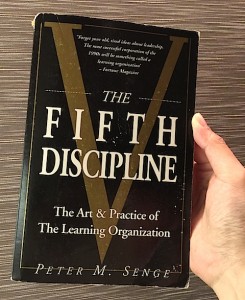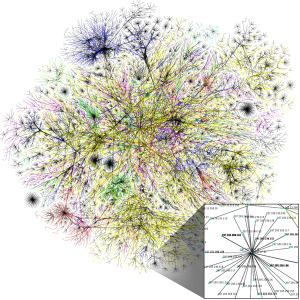Remember 1993?
The World Wide Web (which we now simply call the Internet) was beginning to take shape with the launch of Mosaic web browser. It was also the year I first encountered the term Systems Thinking.
 The Cambridge University MBA programme, in particular Dr. John Roberts, took us on this weird and wonderful world of seeing our workplaces and the world through the lens of interconnectivity. I fell in love with the idea once I understood it. I devoured every page of Peter Senge’s book, The Fifth Discipline (1990), and I still have my copy today, albeit somewhat tattered (yes, that is my copy on the right).
The Cambridge University MBA programme, in particular Dr. John Roberts, took us on this weird and wonderful world of seeing our workplaces and the world through the lens of interconnectivity. I fell in love with the idea once I understood it. I devoured every page of Peter Senge’s book, The Fifth Discipline (1990), and I still have my copy today, albeit somewhat tattered (yes, that is my copy on the right).
I did not get to do very much with systems thinking in the business world, but my exposure to it changed my worldview and eventually led me into becoming trained in family systems work as a therapist.
After 15 years of studying and doing family systems therapy, I decided that this year – 2015 – would be the year where I explored how my knowledge of family systems could be used in organizations. I started by asking myself this question:
If my knowledge of family systems can help my family and the families I work with to become healthier and more functional, can I impart group leaders with the same knowledge to improve the health and functioning of their teams? Can systems thinking actually help organizations?
Curiously, from my research, systemic therapists and systemic thinkers in the organizational world have not intersected as much as I would have expected. There have been some articles and books published, but they are far and few. (See Emerging Bibliography below for a small list of articles/books found so far.)
So as I venture back to read Senge, I am asking myself what has taken place 25 years after Senge published The Fifth Discipline?
I am discovering that systemic thinking and practice has not taken root in a way that I imagine it would have. Rather than to become a well-used term or concept within management circles, a systemic orientation seems to be permeating our consciousness in a much broader and fundamental way.

Like the internet, people now see the world more in networks than in hierarchies. Infographics on the latest understandings of the human brain also highlight the same idea of interconnectedness. However, as I interact with people, my sense is that people still think of network and interconnectivity more as a static picture than the dynamic interactions that make the interconnections. I am open to be corrected, but it seems as though the idea of dynamic interactions is just not that intuitive.

One other interesting observation I have made is the connection between complexity and focus. Many of the proponents of systemic thinking in the org world seem to embrace mindfulness meditation. I am not sure whether it is because systemic thinking is so complex that it requires us to learn to slow down so that we can take it all in, or if mindfulness practice is necessary for us to be able to see the bigger interconnections. Which one comes first is, of course, a linear (non-dynamic/systemic) question. So let’s just ignore it. For now.
I am very much looking forward to exploring this topic. If you have any thoughts to share, please feel free to comment.
Emerging Bibliography
Billings, J. C., Kimball, T. G., Shumway, S. T., & Korinek, A. W. (2007). Organizational Systems Questionnaire (OSQ) Validity Study. Journal of Marital and Family Therapy. [link]
Cox, D. W. (2006). The Edwin Friedman Model of Family Systems Thinking: Lessons for Organizational Leaders. [link]
Kott, K. B. (2012). Application of Bowen Theory to Organizational Development Practice. Ph.D. Dissertation [link].
Kott, K. B. (2014). Applying Bowen Theory to Work Systems. OD Practitioner [link].
Matheny, A. C. & Zimmerman, T. S. (2010). The Application of Family Systems Theory to Organizational Consultation: A Content Analysis. The American Journal of Family Therapy [link].
Repp, P. (2001). Church Is Like Family? Systems Theory in Church and Organizational Interventions. [link]
Steinke, P. L. (1993/2006). How Your Church Family Works: Understanding Congregations as Emotional Systems. [link]
Steinke, P. L. (1996/2006). Healthy Congregations: A Systems Approach. [link]
Steinke, P. L. (2006). Congregational Leadership in Anxious Times: Being Calm and Courageous No Matter What. [link]
[Note: Much has been written in the family business field with respect to systems thinking. Here, I am exploring how systemic therapy has informed organizational leadership and consulting in general.]
—
© Johnben Loy, 2015. Unauthorized use and/or duplication of this material without express and written permission from this blog’s author and/or owner is strictly prohibited. Excerpts and links may be used, provided that full and clear credit is given to Johnben Loy and www.johnbenloy.com with appropriate and specific direction to the original content.
